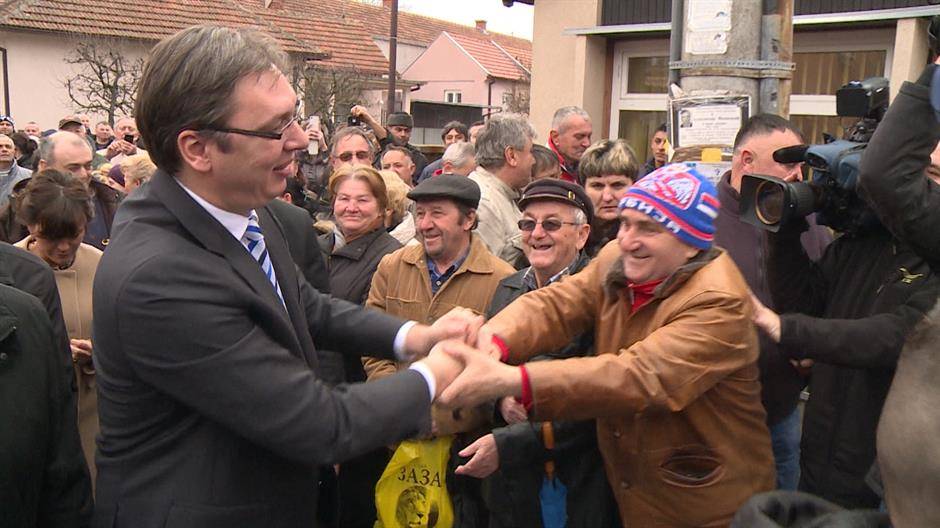It was a gloomy Sunday last September when Ivica Dačić, Vojislav Šešelj and Informer editor-in-chief Dragan J. Vučićević were sitting in the studio of Pink television. They were guests on the Hit Tweet show and were talking about Europride, which had been held right before.
“There were no problems six or seven years ago. Maybe there wouldn’t have been even now if those tycoon-Šolak-mainly-western-controlled media weren’t creating an atmosphere of conflict and lynching,” Vučićević was practically shouting.
The guests of the show could not agree on whether Europride should have taken place. The heated discussion was interrupted by the host, who announced commercials.
“Let’s take a short break.”
However, that break was not short. It lasted about 15 minutes, and not long after that there was another block of commercials lasting nearly 16 minutes.
This is not in accordance with the Law on Advertising, which states that commercial television stations can air only 12 minutes of advertisements in one hour. However, Pink was not sanctioned for this.
The Regulatory Authority for Electronic Media (REM), which is supposed to file misdemeanor charges against TV stations for violating this law, has not done this once in the last year. With this, REM has helped television owners to earn millions of euros without penalty.
This is just one more thing in a system that already favors TV stations that don’t respect the law. The Center for Investigative Journalism of Serbia (CINS) has also uncovered that in previous years, when proceedings were initiated, TV stations were mostly not sanctioned in court or often with minimal punishments that are far less than what TV stations earn while operating outside the law.
Former REM Council member Judita Popović sees in this relationship an overall pattern of behavior towards TV stations with a national frequency.
“This is part of the corpus of abuses of those televisions with the clearly tacit consent of REM when it fails to act in this way.”
A year of silence
Everything starts in REM’s professional service.
They have a special software that monitors television programs. Some of the violations can be recognized by the software itself, and some are manually added by employees. All this goes into the service’s report, and then all that remains is for the REM Council to discuss it at their session and file misdemeanor charges.
However, Judita Popović, who was on the Council of REM until June of this year, says that since the beginning of this year, there has been no talk about it.
“It is usually discussed at the sessions. There is a report published periodically on how many violations of the Law on Advertising there have been, and then a decision is made to file misdemeanor charges against them. It’s practically run-of-the-mill, nothing spectacular.”
The Misdemeanor Court in Belgrade confirms that no charges were filed, as does REM’s website, where both charges filed and verdicts are posted.
On the other hand, TV stations have failed to obey the law.
According to information obtained by CINS, in August last year alone, Pink and Happy did this more than 800 times.
If we consider that, according to the latest price list available, one second of advertising on Pink costs up to 24,000 RSD, the value of such advertising space can be worth more than 800 million RSD. However, experts say that in practice, TV stations give discounts on advertising, so the exact earnings cannot be calculated that easily.
Political scientist and communications expert Nikola Parun says that thanks to, among other things, this kind of income from advertising, TV stations – especially those with a national frequency – can invest more money in production, including political and social programs. This then has a great impact on shaping citizens’ attitudes.
In addition, REM has one year to at least submit a charge to the court, and if it does not do so, the statute of limitations for these violations expires. For this reason, it is already too late for some offenses made last year.
Judita Popović couldn’t tell us why there have been no charges filed in the last year, while REM did not respond to our questions sent by email.
However, even when they do go to court, these proceedings generally end up with the statute of limitations expiring or with minimal penalties.
Economic crisis – a regular excuse for Pink
It was Wednesday, 19 June, 2019, when a piece of registered mail was sent to the address of the Misdemeanor Court in Belgrade. It contained a letter in which Pink pleaded in relation to the misdemeanor report filed against them by the Regulatory Authority for Electronic Media. They admitted that they violated the Law on Advertising.
They asked the court to understand the “difficult financial situation in which Pink television finds itself in”.
“In fact, due to the global economic crisis, which is often inevitably reflected in the business operations of legal entities in our country, the defendant legal entity is often unable to collect its claims against third parties, and is even more often blocked by commercial banks.”
The economic crisis has been used as a defense by Pink for years – CINS uncovered 13 convictions in the last six years in which it is mentioned. During this time, Pink owner Željko Mitrović has been constantly boasting about Pink’s record earnings.
However, the judge imposed a minimum fine. She imposed a total fine of 3.3 million RSD on 11 instances of the law that were violated. A fine of 300,000 RSD was also to be paid by Ivan Vlatković, Director of Marketing at Pink. Neither the court nor REM requested that the millions they earned by violating the law be paid back.
This is one of 106 proceedings completed by October 2023, which were initiated due to suspected violations of the Law on Advertising by TV stations in the last six years. In most of them, either the statute of limitations expired or the penalties were minimal.
There were also occurrences where a minimum fine was imposed on the TV station, which it did not pay, so the procedure went to enforcement, and then its statute of limitations expired.
Vida Petrović Škero, former President of the Supreme Court, who was also a member of the Press Council, says that one of the reasons for the statute of limitations expiring is that the charges were submitted late.
“When the court receives it and by the time the case reaches the judge, the statute of limitations has expired. This is what happens almost on a regular basis. What the purpose of all this is – whether a certain media outlet is being protected or REM is essentially not doing its job – that is a question for them.”
Vladana Jaraković, a lawyer from the Center for Research, Transparency and Accountability (CRTA), says that the Law on Electronic Media will be changed soon. In the working version of the draft of the new law, it is stipulated that REM will be able to temporarily prohibit the media from publishing advertising messages, i.e. commercials.
“However, the key to realizing the potential of that mechanism is REM, and at this moment, unfortunately, there are no indications that the new law will contribute to making REM more independent, professional or useful for the public interest than it is today.”
She believes that it would be different if REM imposed measures. Judita Popović also agrees with her.
“To pronounce its sanctions that are there even within existing laws – notice, warning, temporary ban on broadcasting or revoking the national frequency licence. I think that the latter would very much affect their behavior.”
The project “Rescuing Public Resources – a Leaky Ship” is supported by the Ministry of Foreign Affairs of the Kingdom of the Netherlands as part of the MATRA program.







What do you think